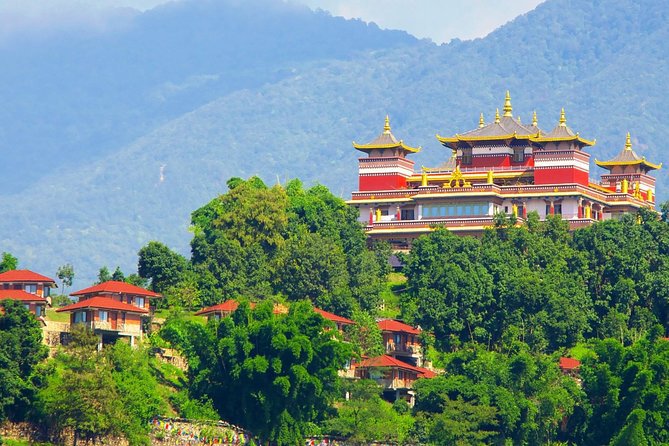Just north of the ancient Buddhist town of Boudhanath is the Kopan hill, which rises up out of the terraced fields of the Kathmandu valley and is visible for miles. Dominated by a magnificent bodhi tree . Kopan Gumba is one of the most popular monasteries of Tibetan Buddhism. Each year a large number of foreigners arrive here to study Buddhism and meditation. Kopan Monastery was founded by Lama Thubten Yeshe who died in 1984. Interestingly, a small Spanish boy named Osel Torres became his successor after he was declared a reincarnation of the great Lama. However, the reincarnation does not reside at Kopan anymore.
The spiritual program at Kopan offers introductory level courses in what is known as the Discover Buddhism series, dealing with the basic principles of Tibetan Buddhism and meditation. The series known as the Next Step series, leads on to a deeper exploration of these principles.
Courses deal with Mind Training, Karma, Death and Dying, Bodhicitta, and more. There are 5-day and 10-day courses and a month long course on meditation. There are also short courses on Tibetan medicine, Thangka painting and the very popular 10-day residential courses in Buddhist psychology and philosophy. Courses vary in length and some students spend months at the monastery devoted to their studies. In the past many were housed in tents due to lack of space but now there are enough rooms to accommodate them.
There is a sealed road all the way to the monastery but it is also a pleasant hike from Boudha. People from many different Nepali ethnic groups also join the monastery at a very young age to become monks. These young lads get formal education in math, science and other subjects just as their contemporaries in local schools. The kids are mostly from families who traditionally send one child to become a monk or a nun.
Kapan Monastery was once open to visitors all week but with too many visitors arriving, entrance has been restricted. There is a library and a large garden that is lighted up by solar lights in the evenings. A proper restaurant with great views of Kathmandu down below is open to all and serves good meals. During special pujas, large crowds of devotees climb up to the monastery to receive blessings and pay homage.

Having reached Kapan Monastery, you might as well walk along the ridge and visit the Phulhari Monastery which sits on a hill higher than Kopan. The hike takes less than an hour. In between the two is the Vajrayan Monastery. Phulhari is worth a visit for the amazing Thangka paintings that adorn the entire facade and the interiors of the halls. The building was designed by an American architect /Buddhist monk who has combined the best of eastern and western architecture. Even the paintings lean towards more pastel colors rather than the bright colors usually associated with Tibetan Buddhism.
Table of Contents
Getting To Kopan Monastery
Kopan is situated on the outskirts of Kathmandu, near Boudhanath (also called Boudha). It is about 15 km from the city, and about 5 km from the airport. The road to the monastery is accessible all year round.
The gate of the monastery is closed from 5 pm onwards. Please schedule your arrival to coincide with the opening hours of the office (9 am -11.30 am, 1pm-4.30 pm).
If your flight arrives after 5 pm, we recommend that you stay overnight in a hotel and come to Kopan the next morning.
Coming From the Airport
Take a taxi to Kopan, which is near Boudhanath. Ask for Kopan Gompa. Best to book a taxi from the Prepaid counter just outside the arrival hall. The cost from the airport is approximately 1000 rupees. (http://prepaidtaxinepal.com/index.php/location)
You can also take any taxi outside the arrival hall, if you don’t mind bargaining for the price.
Coming from Kathmandu
You can take a taxi all the way up to Kopan – ask for Kopan Gompa. From Thamel, the cost is around to 500 rupees. You can try to bargain for lower prices. Taxis are plentiful in Kathmandu.
There are public buses going from Ratna Park directly to Kapan village. From there it is a 10 minute walk to the monastery, all the way uphill.
Coming from Boudhanath
You can walk from Boudhanath, a 40 minute walk approximately. There are no signposts, but you will be able to get directions by asking for Kopan Gompa.
A taxi from Boudhanath will be around 300 – 350 rupees.
By onfoot
There are three main routes to Kopan Monastery. The most enjoyable walk is from Boudha. Walking from the east side of the stupa, the road goes through Phulbari and meets the road coming from Chuchepati. Then it’s downhill and the monastery comes into view. You then climb up towards it. The other route is through Chabahil turning left at Chuchepati where one can see a statue of Pasang Lhamu, the first Nepali female to climb Everest. The third route follows the Ring Road after Chabahil and goes past the Gopi Krishna Radha Cinema Hall. There are buses up to the base of the hill on top of which the monastery is perched. Taxis can be hired from the city. Other alternatives are to hire a motorcycle, mountain bike or just simply walk all the way.




